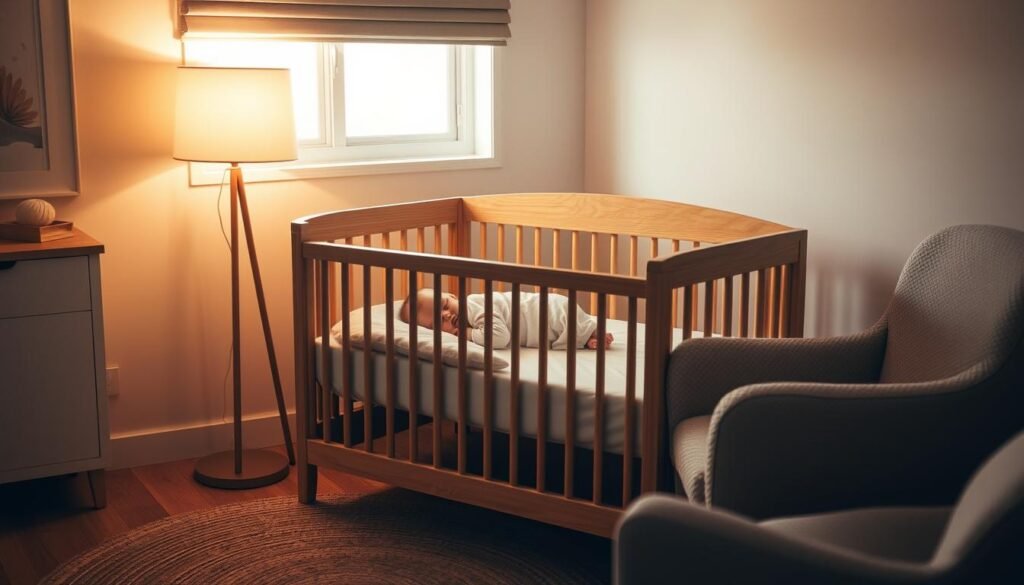As a new parent, I’ve learned that a 1 month old’s sleep schedule is key. On average, a 1 month old baby sleeps about 15.5 hours in a day. This sleep is divided into naps and nighttime rest.
Understanding how much sleep a newborn needs is important. It helps them grow and develop well. I’ve found that a 1 month old baby’s wake windows are 50-90 minutes. They usually nap 5-8 times a day.
The best bedtime for a 1 month old varies. It can be between 7-8 PM or 8-10 PM. A 1 month old sleeps 14-17 hours in 24 hours. Their sleep can last from 10-20 minutes to 2 hours.
Creating a consistent sleep schedule is crucial. A sleep-friendly environment also helps. I’m excited to learn more about supporting my baby’s sleep needs.
By understanding a 1 month old’s sleep schedule, I can help my baby rest well. This is important for their growth and development.
Understanding Your One-Month-Old’s Sleep Needs
As a new parent, knowing your one-month-old’s sleep needs is key. Babies at this age sleep a lot and their sleep patterns can change often. Let’s explore their total sleep needs, sleep cycles, and when they’re ready to sleep.
Infants up to 3 months need 14–17 hours of sleep in 24 hours. This includes both day and night sleep. A sleep schedule for a one-month-old includes 5-8 naps, lasting 20 minutes to 2 hours. It’s important to have a regular sleep routine for your baby.
Total Sleep Requirements at One Month
At one month, babies need lots of sleep for growth and development. They sleep more during the day and at night. Daytime naps are 5-8, and nighttime sleep is 5-6 hours.
Sleep-Wake Cycles in Newborns
Newborns’ sleep patterns are not regular, with wake times from 50-90 minutes. They can wake up for short periods before needing to sleep again. A consistent sleep routine can help improve their sleep quality.
Signs of Sleep Readiness
Knowing when your baby is ready to sleep is crucial. Look for yawning, rubbing their eyes, and becoming less active. Putting your baby to bed when they show these signs helps them sleep better.
By following these baby sleep tips and setting a regular sleep routine, you can help your baby sleep well. Remember, every baby is different, so be patient and flexible with their sleep needs.
Here are some key takeaways for your one-month-old baby’s sleep needs:
- Establish a consistent sleep routine to help your baby develop healthy sleep habits
- Watch for signs of sleep readiness, such as yawning and rubbing their eyes
- Put your baby to bed when they show signs of sleep readiness
- Aim for 14-17 hours of sleep over a 24-hour period, including both daytime and nighttime sleep
By following these tips and being mindful of your baby’s unique needs, you can help them develop healthy sleep habits. This improves their sleep quality. It also helps you establishing healthy sleep habits and create a sleep-friendly environment for your baby to thrive.
Typical 1 Month Old Sleep Schedule
As a new parent, understanding newborn sleep development is key. At one month, babies sleep a lot, needing 14 to 18 hours daily. This breaks down into 6 to 8 hours during the day and 8 to 10 hours at night.
Helping your infant sleep well is vital for their growth. A 1-month-old baby usually takes 5-8 naps, lasting from 20 minutes to 120 minutes. It’s important that no nap goes over two hours to keep up with feeding needs. Here are some tips for setting up a sleep schedule for your 1-month-old:
- Wake windows: 50-90 minutes
- Daytime feedings: every 2-3 hours
- Bedtime: between 7-8 PM or 8-10 PM
- Total sleep duration: 12-12.5 hours per night
Every baby is unique, so being flexible with sleep schedules is crucial. By grasping newborn sleep development and promoting better sleep for infants, you can help your baby develop good sleep habits early on.
Some babies might get day-night mixed up, sleeping too much during the day and being awake at night. If you’re worried about your baby’s sleep, talking to your pediatrician is a good idea.
Creating the Perfect Sleep Environment
As a new parent, making a sleep-friendly space is key for your baby’s growth and health. A well-thought-out sleep area can improve your baby’s sleep and lower sleep problem risks. Important factors include temperature, lighting, and sound levels.
A safe sleep surface setup is vital for your baby’s safety and comfort. This means a firm, flat mattress and a sheet that fits snugly. Keeping the sleep area quiet, dark, and at a comfy temperature is also crucial. The American Academy of Pediatrics suggests a temperature of 68-72°F (20-22°C) for baby sleep.
Setting up a baby bedtime routine is also important. This can include bath time, reading, and singing. A regular bedtime routine helps your baby learn to fall asleep on their own. By making a sleep-friendly space and a consistent bedtime routine, you help your baby develop good sleep habits for life.
Temperature and Lighting
- Keep the room at a comfortable temperature (68-72°F or 20-22°C)
- Use dim red lights to create a sleep-conducive environment
Sound and White Noise
A white noise machine or a fan can block out other sounds. They create a constant, soothing noise that helps your baby sleep better.
Daytime Nap Patterns and Duration
As a new parent, setting up a regular infant sleep routine can be tough. But it’s key for your baby’s growth. At one month, babies sleep 5 to 8 times a day. Each nap can last from 20 minutes to 120 minutes.
To make a sleep-friendly space, look for sleepy signs. The room should be dark, quiet, and just right for comfort.
For baby sleep tips, knowing wake windows is crucial. One-month-olds need 50-90 minutes of wake time. By 4 weeks, it’s 50-70 minutes. As they get older, wake windows grow, reaching 60-90 minutes by 7 weeks.
Keep wake times short for lots of rest. This helps your baby sleep well.
- Watch for sleepy cues, such as yawning or rubbing their eyes
- Keep the room dark, quiet, and at a comfortable temperature
- Use white noise or a fan to block out any background noise
- Avoid overstimulating your baby before nap time
By following thesebaby sleep tipsand setting up a regularinfant sleep routine, you can help your baby sleep well for life.
Establishing a Bedtime Routine
As a new parent, setting up a bedtime routine is key for your baby’s sleep health. It helps them learn to fall asleep on their own. For a one-month-old, keep the routine simple and adaptable.
At this age, babies need short wake times and many naps. Watch for sleepy signs like yawning and rubbing their eyes. Start your routine with a warm bath, followed by reading and singing.
Essential Routine Components
Choose activities that calm your baby for bedtime. Key parts include:
- A warm bath to relax
- Reading to create a cozy feel
- Singing to help them unwind
Timing Your Routine
Timing is everything in a bedtime routine. Start around the same time each night. For a one-month-old, this could be 7-8 pm or 8-10 pm.
Consistency Tips
Consistency is key for a good bedtime routine. Stick to it every night, even on weekends. This helps your baby sleep better and develop healthy habits.
| Age | Wake Windows | Nap Duration |
|---|---|---|
| 1 month | 50-90 minutes | 20-120 minutes |
| 4 weeks | 50-70 minutes | 20-120 minutes |
| 6 weeks | 55-80 minutes | 20-120 minutes |
Common Sleep Challenges at One Month
Being a new parent means facing sleep challenges with your baby. At one month, babies need about 15.5 hours of sleep each day. This includes 8 to 9 hours at night and 7 hours during the day. But, setting up a sleep routine can be tough, and many parents find it hard to help their babies sleep better.
Some common issues at this age include day-night confusion, being overtired, and sleep regressions. To tackle these, it’s key to make the sleep environment cozy and keep a regular sleep schedule. This means a dark, quiet room at a comfy temperature and avoiding too much activity before bed.

To help your baby sleep better, watch for sleepy cues like yawning or rubbing their eyes. Also, make sure they’re not too full or too hungry, as this can mess with their sleep. By knowing these challenges and taking steps to fix them, you can help your baby sleep well and improve sleep for everyone in the family.
Here are some tips to help your baby sleep better:
- Establish a consistent sleep schedule
- Make the sleep environment cozy
- Keep things calm before bedtime
- Look for sleepy cues
- Avoid overfeeding or underfeeding
By using these tips and understanding the common sleep issues at one month, you can help your baby develop good sleep habits. This is crucial for their newborn sleep development and for better sleep for the whole family.
Feeding and Sleep Connection
As a new parent, understanding how feeding and sleep are linked is key. Setting up a nighttime feeding schedule and handling cluster feeding are vital. These steps help your baby develop good sleep habits.
Watching for sleepy cues like yawning or rubbing eyes is crucial. This tells you when it’s time for sleep. Also, making the feeding area quiet and dark helps your baby link feeding with sleep.
Nighttime Feeding Schedule
A regular nighttime feeding schedule helps your baby learn to fall asleep on their own. Feed your baby every 2-3 hours during the day. A consistent bedtime routine, like a warm bath or lullaby, helps your baby associate these with sleep.
Managing Cluster Feeding
Cluster feeding can be tough, but there are ways to handle it. Offering a pacifier or comfort object can help your baby relax. Using a baby carrier can also make your baby feel secure. These strategies help your baby sleep better and feel more comfortable.
Some important facts about feeding and sleep include:
- Newborns need to sleep 14-17 hours in 24 hours.
- Babies aged 0-4 weeks sleep in 35-60 minute windows.
- Feed your baby every 2-3 hours during the day, based on hunger.
By following these tips, you can help your baby sleep well and stay healthy. Always remember to adjust to your baby’s unique needs and be flexible with feeding and sleep times.
| Age | Sleep Hours | Wake Windows |
|---|---|---|
| 0-4 weeks | 14-17 hours | 35-60 minutes |
| 4-12 weeks | 16 hours | 60-90 minutes |
Signs Your Baby’s Sleep Schedule is Working
As a new parent, it’s key to know when your baby’s sleep schedule is on track. Look for signs of newborn sleep development and key markers that show they’re resting well. Understanding these signs helps you tweak their sleep schedule for better rest.
It’s vital to promote better sleep in infants for their growth. Start a consistent sleep routine and create a sleep-friendly environment. This means a dark, quiet room at a comfy temperature. Such habits are good for your baby’s sleep health in the future.
Development Markers
Watch for these important development signs:
- Regular wake windows: usually 50-90 minutes for 1-month-old babies
- Consistent nap schedules: 5-8 naps daily, lasting 20 minutes to 120 minutes
- Improved sleep quality: total sleep time under 12-12.5 hours, including feeding
Sleep Quality Indicators
Also, look for these sleep quality signs:
- Increased alertness during wake times
- Better mood and less fussiness
- Improved feeding habits: daytime feedings every 2-3 hours, with nighttime feedings less often

By spotting these signs and adjusting their sleep schedule, you can help your baby sleep better. Always keep their unique needs in mind and talk to your pediatrician if you’re worried.
Setting the Foundation for Future Sleep Success
As your little one starts their sleep journey, it’s key to build a strong foundation. Create a sleep-friendly space, follow a bedtime routine, and watch for sleepy cues. This helps your baby develop good sleep habits for the future.
Newborns need help to fall and stay asleep. But with time, they can learn to soothe themselves. Pay attention to when your baby is sleepy. Avoid keeping them awake too long to prevent overtiredness.
Managing your one-month-old’s sleep schedule is important. You’re setting them up for a lifetime of good sleep. By focusing on healthy sleep habits early on, you’re helping your child grow and thrive.


